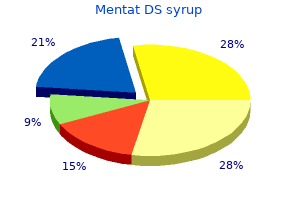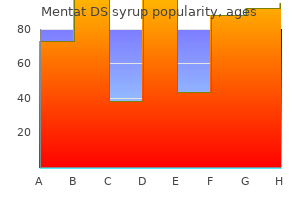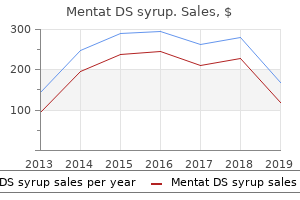"Purchase mentat ds syrup in united states online, treatment jokes".
By: Q. Hogar, M.S., Ph.D.
Associate Professor, Dartmouth College Geisel School of Medicine
Systematic reviews note that the few studies looking at the effect of massage on pain use rigorous methods and large sample sizes treatment zona generic mentat ds syrup 100 ml free shipping. Mindfulness enables an attentional stance of removed observation and is characterized by concentrating on the present moment with openness symptoms pink eye buy mentat ds syrup overnight, curiosity treatment bacterial vaginosis safe 100 ml mentat ds syrup, and acceptance symptoms bipolar disorder cost of mentat ds syrup. Yoga has become popular in Western cultures as a form of mind and body exercise that incorporates meditation and chants. Modern tai chi has become popular for core physical strengthening through its use of slow movements and meditation. It has demonstrated long-term benefit in patients with chronic pain caused by osteoarthritis and other musculoskeletal pain conditions. People living with pain may use religious or spiritual forms of coping, such as prayer and meditation, to help manage their pain. Growing evidence indicates that spiritual practices and resources are beneficial for people with pain. The populations highlighted here are not exhaustive, and the special populations section on chronic relapsing conditions is intended to serve as a general category that applies to many painful conditions not specifically mentioned. The origin of pain conditions in the pediatric age group is important because the developing pediatric nervous system can be especially vulnerable to pain sensitization and development of neuroplasticity. Psychological conditions resulting from chronic disease and pain syndromes can contribute to long-term pain. These psychological conditions can include difficulty coping, anxiety, and depression. Incorporation of parents and family into pain care is especially important in the pediatric population because childhood pain can be affected by family and parental factors, including family functioning and parental anxiety, and depression. Overall, there is a substantial need for more trained pediatric pain specialists to address the often complex aspects of pediatric pain. There is a greater challenge in attracting top physicians to further specialize in pediatric pain fellowships, and this aspect of medical education would address an ongoing gap in this area. This limited access is further compromised by lack of reimbursement and coverage for services related to comprehensive pain management, including nonpharmacologic evidence-based pain therapies. However, a risk factor of a medication should not necessarily be an automatic reason not to give this medication to an elderly patient. Clinicians must assess the risk versus benefit of using medications while considering other modalities in this patient population. An estimated 40% of cancer survivors continue to experience persistent pain as a result of treatments such as surgery, chemotherapy, and radiation therapy. Persistent pain is also common and significant in patients with a limited prognosis, as often encountered in hospice and palliative care environments. Many oncologists and primary care physicians are not trained to recognize or treat persistent pain associated with cancer or other chronic medical problems with limited prognosis. Causes of pain such as recurrent disease, second malignancy, or late-onset treatment effects should be evaluated, treated, and monitored. Women use the health care system as patients, caregivers, and family representatives and can be particularly affected by costs, access issues, and gender insensitivity from health care providers and staff. Several diseases associated with pain - in particular, chronic high-impact pain - have a higher prevalence in women or are sex specific, including endometriosis, musculoskeletal and orofacial pain, fibromyalgia, migraines, and abdominal and pelvic pain. Acute pain flares on top of the chronic pain condition can be a common occurrence that may affect daily routines and overall functionality, resulting in additional morbidity and the need for comprehensive pain care. I struggled with depression for a while and as recently as last February, I went through a period of depression. I have had brain surgery due to Chiari I malformation from sickle cell, which caused multiple migraines every day. I would still go out and have fun with my friends, even though I was still going through all this pain. I barely go to a hospital for my crisis now because I try to find ways at home to get rid of my pain. Constraints on opioid treatment duration can make individualization of pain management difficult. Further, limited access to oral opioids at home for the treatment of unplanned acute pain can result in increased use of health care services that could have been avoided. Effective strategies and plans to address these issues specifically in these disparate communities are necessary to address these gaps to improve patient outcomes. Evidence exists of racial and ethnic disparities in pain treatment and treatment outcomes in the United States, yet few interventions have been designed to address these disparities.

Not all patients who may benefit from transplantation will actually receive a kidney transplant due to the shortage of donor organs symptoms e coli generic mentat ds syrup 100 ml mastercard. Some regions have limited access to deceased donor kidney transplants based on anticipated survival symptoms 9 days post ovulation order mentat ds syrup toronto. Given the difficult decisions regarding candidacy in some patients treatment 12th rib syndrome cheap 100 ml mentat ds syrup visa, it is advisable to use a multidisciplinary team to evaluate and decide about suitability for transplantation symptoms gestational diabetes buy cheap mentat ds syrup 100ml. Since some comorbid conditions are only relative contraindications and can improve over time, a re-evaluation of patients initially denied may be advisable. Similarly, since much of this decision making is subjective in nature, patients should be informed of their option to seek a second opinion from another transplant center if they are declined. There are many potential predictors of post-transplantation outcomes for patients undergoing evaluation for kidney transplantation candidacy. Numerous registry studies have been analyzed to evaluate whether a host of risk factors may be predictors of post-transplantation outcomes. The registry studies are described in Summary Tables: Registry studies; Evidence Profiles: Pre-transplant predictors summarize the evidence regarding pre-transplantation predictors of post-transplantation mortality, graft loss, and other outcomes. Potential candidates should begin the evaluation process at least 6 to 12 months before the anticipated start of kidney replacement therapy. Earlier evaluation may render some of the diagnostic tests outdated while a delay might lead to an incomplete work-up and miss the opportunity for pre-emptive transplantation. Consequently, it is important to clarify if there is a survival advantage in using these kidneys compared to remaining on dialysis. This is distinguished from academic assessment, which evaluates academic performance in relation to expected performance based on age and on neurocognitive abilities. Neither neurocognitive nor academic assessments should be used to determine transplant eligibility. While the intelligence of the majority of pediatric kidney transplant recipients is in the average range, a greater than expected proportion are in the impaired, borderline, or low average range compared with healthy children. Assessment of cognitive and academic function will help set appropriate expectations for patients, parents, and educational professionals, and will guide provision of appropriate services, including accommodations and support. There are several potential reasons for these inconsistencies, including changes in the severity of deficits over time due to improvements in care, heterogeneity of the populations studied, small sample sizes, and inclusion or exclusion of children with comorbid neurological conditions. Results are effort-dependent; assessment tools may not be available in all languages and some may be difficult to interpret in children from non-Western cultural backgrounds. No studies have examined the impact of pre-transplant neurocognitive and/or academic performance assessment on long-term outcomes. Therefore, the value of such assessments in improving academic, occupational, quality of life or self-care (and therefore graft) outcomes is unknown. What prior guidelines recommend To our knowledge, no prior guidelines addressed the issue of neurocognitive or academic assessment in pediatric candidates. Economic analyses or cost-benefit studies would also be helpful, especially in resource-limited regions. Moreover, a comprehensive psychosocial assessment allows for identification of factors that may adversely impact the success of transplantation and for targeted interventions to be implemented, thereby enhancing the likelihood of a favorable outcome for the patient. Published guidelines, consensus statements, transplant center protocols, regulatory requirements, and clinical practice articles representing several countries were reviewed for content pertaining to the psychosocial assessment. Psychosocial evaluation is mandatory in some regions, at the discretion of transplant centers in other regions, or not performed in some parts of the world due to lack of qualified mental health professionals. Additionally, even when a psychosocial assessment is performed as part of the transplant evaluation, there is no empirical evidence on who should conduct the assessment, how the assessment should be conducted, what factors are most essential to evaluate, and how to handle psychosocial issues that are uncovered during the assessment. Evidence is limited and generally weak regarding the predictive role of pre-transplant psychosocial factors on post-transplant outcomes. Consequently, recommendations put forth regarding the psychosocial assessment, like prior guidelines, are based largely on expert opinion. Our suggestion is consistent with prior guidelines, regulations in some countries, and expert opinion, which describe the psychosocial assessment as an important and essential part of the evaluation of each potential transplant candidate. The psychosocial assessment should be conducted by a qualified health care professional. The type of health care professional (eg, social worker, psychologist, psychiatrist, psychiatric nurse practitioner) may vary from center to center and region to region; however, the health care professional should be knowledgeable of and experienced in the psychosocial aspects of transplantation. There is considerable variability in how psychosocial assessments are performed across transplant programs and regions.

They also recommend pretransplant parathyroidectomy for patients with symptomatic secondary hyperparathyroidism treatment for chlamydia cheap mentat ds syrup online visa. In addition treatment for strep throat buy mentat ds syrup 100 ml lowest price, up-to-date testing will ensure the ready availability of the necessary recipient information required to facilitate allocation treatment yeast infection men purchase discount mentat ds syrup on-line, perform transplant decision making and donor-recipient immunologic risk assessment at the time of transplant treatment resistant schizophrenia buy discount mentat ds syrup 100ml. This section contains clinical recommendations for histocompatibility testing, basic technical interpretation and actions as they relate to immunologic risk assessment of the potential transplant recipient during workup and while waitlisted. Documenting and reporting a reliable clinical history is an ungraded recommendation as there are no specific studies addressing the impact of this practice; however it is low cost, of high benefit, and universally accepted as necessary for good clinical practice. Laboratories often use their own data to determine the stability of patient results over time to then inform the recommended testing frequency in their unique populations and best identify humoral alloreactivity and potential for memory responses. This recommendation for testing frequency is made with the intent that the clinical team liaise with their respective laboratories about the testing frequency that can be supported at their site, which would provide adequate immunologic risk assessment for a given patient. Indeed, testing frequency may also vary between patients at a given center depending on the relevant clinical circumstances. Additional testing after interval sensitizing events is recommended in all patients to accurately document de novo as well as memory responses which may in some cases be transient and not readily detectable at the time of the next routinely schedule clinical test. The timing of testing after a sensitizing event may be sooner than six weeks depending on clinical need. Where financial considerations may prevent regular testing, we encourage a baseline test and repeat testing 2 to 6 weeks after sensitizing events. In the former, serum from the recipient is mixed with a panel of cells derived from a population that is immunogenetically comparable to the donor population of interest. There are increasing data that antibodies to these loci may also be deleterious after transplant, requiring that they be fully characterized in recipients; this will provide a robust antibody analysis as well as quantify mismatches with future donors. In patients where history or clinical status indicates that these antibodies may have clinical relevance, testing should be performed on a case-by-case basis. Serum dilution can abrogate a positive assay and serum concentration can change a previously negative assay to positive. Conflicting data exist as to the relationship between complement binding assay results and transplant outcomes. Desensitization with anti-B cell agents (eg, rituximab), proteasome inhibitors (eg, bortezomib), alone or in combination with other protocols, may increase transplant opportunities in the short term but, depending on antibody strength, can be associated with shortened longterm survival. The corresponding standards from European Federation of Immunogenetics may be found at: /efi-web. The former guidance recommended best practices, with the current guideline providing alternatives to best practices in certain circumstances, while being mindful of international differences in patient populations and resources. The Work Group considered all of the valuable comments made and, where appropriate, suggested changes were incorporated into the final publication. Barsoum, Rommel Bataclan, Kim Baunach, Irene Bellini, Ali Benziane, Carmen Bernis, Rahul Bhardwaj, Rajendra Bhimma, Allison Blagg, Danette Borg, Mohammad Bourini, Edwina A. Brown, Markus Burgmer, Kevin Burns, Scott Campbell, Antonio Cardoso, Valerie Cass, Pasqualina Cecere, John Chan, Rafia Chaudhry, Hicham I. Cheikh Hassan, Mary Chittenden, Rolando ClaureDel Granado, Philip Clayton, Abraham Cohen-Bucay, Beatrice Concepcion, Giuseppe Conte, Cindy Cornell, Nick Cross, Helen Currier, Jan Davis, Pat Dennis, Arley Diaz, Fritz Diekmann, Ian Dittmer, Sine Donnellan, Mohammed Edrees, Edmar Elcarte, Magdy El-Sharkawy, Grant England, Riadh Fadhil, Stuart Flechner, Leeann Fox, Ross Francis, Eleni Frangou, Hideki Fujii, Daniel Gale, Alvaro Garcia, Valter Garcia, Michael J. Lerma, Wai Lim, Eduardo Lorca, Fiona Mackie, Magdy Maksy, Francesca Mallamaci, Nizam Mamode, Sreedhar A. Mandayam, Francesco Marchini, Stephen Marks, Roberto Ramirez Marmolejo, Gerson Marques, Carlos E.
Several Johns Hopkins community cardiology clinics also provide periodic arrhythmia device checks treatment menopause cheap 100ml mentat ds syrup with mastercard. Although the range of diagnostic tests and treatment options available to children with arrhythmias is similar to those for adults treatment yeast infection child order discount mentat ds syrup, we recognize that children are not merely "small adults symptoms 9 days after iui purchase mentat ds syrup 100ml with mastercard. Successful treatment of irregular heart rhythms in children requires that doctors understand the types of arrhythmias seen in children as well as developmental issues that may affect them medications quit smoking order mentat ds syrup 100 ml free shipping. Pediatric electrophysiologists also have an in-depth knowledge of the types of heart rhythm problems often associated with congenital heart disease. The special needs of children and their families are addressed throughout the evaluation and treatment process, with extra attention given to age-appropriate explanations and ways to make children comfortable during procedures. Children get a special walk-through before their procedure to make the high-tech electrophysiology lab less intimidating. Nurses and technologists are adept at helping young patients relax, and a pediatric electrophysiologist at Hopkins, is always available to check in before the procedure. They have special needs, both physical and emotional, and careful planning is crucial to ensure that they get the great care they deserve. Johns Hopkins Arrhythmia Service 31 Center for Inherited Heart Disease Clinicians are increasingly recognizing the role of genetics in causing many heart diseases. The Johns Hopkins Center for Inherited Heart Diseases seeks to identify these familial diseases and slow their progression through preventative care. The Center has continued the long-standing tradition of pioneering genetic breakthroughs in the field of cardiology at Johns Hopkins. Genetic testing and advanced imaging help us to tailor medical decisions to the individual patient and families. Medical Director, Center for Inherited Heart Disease Family Centered Care Most inherited heart conditions can affect people at any age. Our genetic counselors see patients of any age, and our team can connect individuals with expert care with our adult or pediatric practitioners. Special facilities available through the Johns Hopkins Center for Inherited Heart Disease include access to specialists in inherited heart disease management, echocardiography, magnetic resonance imaging genotyping and genetic counseling, noninvasive risk assessment for sudden death, defibrillator implantation, catheter ablation, and cardiac transplantation. Patients and relatives are also offered voluntary enrollment in a variety of ongoing research projects. Catheter ablation also plays a very important role in the management of ventricular arrhythmias. The Johns Hopkins Arrhythmogenic Right Ventricular Dysplasia/Cardiomyopathy Program was founded in 1999 to provide specialized evaluation and care of patients. An appointment may involve diagnosis, second opinion and/or management guidelines. We specialize in determining if genetics testing is needed and helping to interpret the results and their implications for your management and your family. Catheter ablation of atrial fibrillation is performed in a catheterization laboratory that uses catheters inserted from the leg. In general, younger patients with a normal-size left atrium, normal heart function and intermittent atrial fibrillation. Some patients need a second ablation procedure six or more months after their first one. Another option available at the Johns Hopkins Heart and Vascular Institute is surgical ablation. This procedure can be performed through small incisions in your chest wall and requires a three- to four-day hospital stay. Your electrophysiologist will provide information about the pros and cons of the various catheter and surgical ablation options and will answer any questions you may have about atrial fibrillation, atrial flutter, atrial tachycardia and their management. The ablation lesions are shown surrounding the two left and the two right pulmonary veins. Balloon based cryoablation of atrial fibrillation is available at Johns Hopkins for specific patients.
Order mentat ds syrup 100 ml amex. HIV & AIDS ഒരാൾ രോഗ ബാധിതനാണോയെന്നു തിരിച്ചറിയാൻ നടത്തേണ്ട പരിശോധനകൾ. Dr Parvathy.


